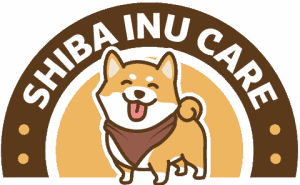This post contains affiliate links.
When it comes to your Shiba Inu’s health and well-being, being aware of common food allergies can be crucial for maintaining a healthy lifestyle. In this article, we’ll explore the symptoms, causes, and solutions for Shiba Inu food allergies.
As a devoted Shiba Inu owner, arming yourself with this knowledge will help you make informed decisions about your furry friend’s diet.
Shiba Inus can suffer from food allergies, just like people. Food allergies usually show as skin irritations, gastrointestinal problems, and behavioral changes that can negatively affect your furry friend’s quality of life. It’s crucial to detect possible allergies as early as possible to avoid any severe complications.

Being proactive in monitoring your Shiba’s diet and adjusting their meals to suit their individual needs will create a happier and healthier pup.
With a little research and attention to potential allergy triggers, you can keep your Shiba Inu’s diet on the right track and ensure they live their best life, free from food-related complications.
Do Shiba Inus Have Food Allergies?
Food Allergies vs Food Intolerance
Shiba Inus can have food allergies, just like any other dog breed. Food allergies occur when your Shiba’s immune system reacts adversely to a particular ingredient in their diet, usually a protein.
On the other hand, food intolerance doesn’t involve the immune system and is usually a result of your dog’s body being unable to digest certain food components, like lactose in milk products.
Symptoms of Food Allergies
If your Shiba Inu has a food allergy, you might notice some of the following symptoms:
- Itchy skin, especially around the face, paws, and ears
- Hair loss or skin infections caused by excessive scratching
- Chronic ear infections
- Gastrointestinal issues like vomiting and diarrhea
Food allergies in dogs can be challenging to diagnose, so it’s essential to consult your veterinarian if you suspect your Shiba has one.
Symptoms of Food Intolerance
Food intolerance in Shiba Inus can exhibit symptoms similar to food allergies, but there are some differences:
- Gurgling stomach sounds or flatulence
- Less severe gastrointestinal issues, like mild diarrhea or vomiting
Keep in mind, food intolerance is generally less severe than food allergies, and managing it might be as simple as removing the problematic ingredient from your dog’s diet. However, always consult your veterinarian to ensure the right course of action.
What Foods Are Shiba Inus Allergic To?
Dairy
First off, dairy products can be troublesome for your Shiba Inu. Just like humans, some dogs are lactose intolerant. This means they might struggle to process milk, cheese, and other dairy-based treats. Symptoms could include diarrhea, gas, and vomiting.
Fruits
While fruits can provide essential nutrients, not all of them are safe for your Shiba Inu. Some common culprits are citrus fruits, grapes, and raisins. These can cause digestive upset or even kidney problems. Stick to safer fruit options like apples, blueberries, and watermelon – but always remove seeds first!
Grains
Grains, especially wheat, tend to be a common allergen for Shiba Inus. Keep an eye out for symptoms like itchy skin or ear infections, which may indicate a grain allergy. Consider switching to a grain-free diet or using alternative carbohydrate sources like rice if needed.
Legumes
While legumes like beans, peas, and lentils can provide valuable nutrients, your Shiba Inu might be allergic to them. Signs of an allergic reaction might include bloating or digestive discomfort. Monitor your dog’s reaction to these foods, and consult your vet about alternatives if needed.
Meats
Certain meat proteins can trigger allergies in Shiba Inus, with the most common being beef and chicken. If your dog reacts poorly to these proteins, try switching to alternative meats like turkey, lamb, or fish.
Nuts
Nuts like almonds and pistachios can be choking hazards for your Shiba Inu, while others, like macadamia nuts, are toxic. It’s best to err on the side of caution and avoid giving nuts to your dog.
Vegetables
Although most vegetables are safe, some Shiba Inus can be allergic to certain types. For instance, onions and garlic should always be avoided as they can cause severe health issues. If you notice any adverse reactions after feeding veggies, consider eliminating them from your dog’s diet and consult your vet for guidance.
How To Treat Your Shiba Inu’s Food Allergies
Contact Your Vet And Schedule An Appointment
If you suspect your Shiba Inu is suffering from food allergies, it’s important to contact your vet and schedule an appointment. Your vet can help determine if your Shiba Inu’s symptoms are due to food allergies or another issue, such as atopy or environmental allergens.
Get Your Shiba Inu Allergy Tested
Your vet may recommend an allergy test for your Shiba Inu to identify the specific allergens causing the issue. There are various tests available, such as blood tests or skin patch tests, that can help pinpoint the cause of your dog’s sensitivity.
Transition Your Shiba To A New Diet
Once the allergens have been identified, transition your Shiba Inu to a new diet. This process typically involves a food elimination trial and a food challenge phase.
- Food elimination trial: During this phase, you’ll introduce a novel protein diet for your Shiba Inu. This means feeding your dog a diet with limited ingredients, and avoiding the allergens causing ear infections, skin issues, or other symptoms.
- Food challenge phase: After a period of improvement, your vet may suggest reintroducing certain foods into your Shiba Inu’s diet one at a time to confirm which ingredients trigger the allergy. During this phase, ensure to closely monitor your dog for any signs of sensitivity, such as skin issues or ear infections.
An elimination diet may require patience and persistence, but it’s crucial to identify the source of your Shiba Inu’s food allergies and ultimately improve your quality of life. Always consult your vet throughout this process to ensure the best course of action for your beloved Shiba Inu.
Summary Of Food Allergies
As a Shiba Inu owner, it’s crucial to understand food allergies and how they can affect your furry friend. Food allergies in Shiba Inus can manifest in various ways, such as hives, chronic ear infections, and even hot spots on their skin. Stomach issues are another common symptom, so always be on the lookout for signs of discomfort or abnormal behaviors.
Based on available statistics, food allergies are a chronic condition that may impact many Shiba Inus. To minimize the chance of your dog developing these symptoms, consider evaluating their diet and paying special attention to common allergenic ingredients.
- Hives: Raised, itchy bumps on the skin can indicate a food allergy. If you notice these on your Shiba Inu, consider consulting with your veterinarian for possible dietary changes.
Chronic ear infections: If your Shiba Inu constantly experiences ear infections, food allergies could be the culprit. Regularly cleaning their ears and discussing potential allergens with your vet might help. - Hot spots: These inflamed, red spots on the skin are not only painful for your dog but could also signal a food allergy. Keep an eye on their coat and overall health to catch this issue early on.
- Stomach issues: Diarrhea, vomiting, or excessive gas could indicate a food allergy. Always monitor your Shiba Inu’s bowel movements and consult your vet for guidance.
Being aware of these symptoms and maintaining a close relationship with your veterinarian is key to ensuring your Shiba Inu’s health and happiness. Making changes to their diet if needed and keeping a close eye on any signs of discomfort will help your beloved pet live a fulfilling, allergy-free life.
Frequently Asked Questions
What Is The Most Common Food Allergy In Dogs?
The most frequent food allergies in dogs are beef, dairy, chicken, and eggs. However, it’s essential to keep in mind that every dog is different, and they may develop allergies to almost any ingredient. An allergy test can help you better understand your Shiba’s unique dietary needs and sensitivities.
What Dog Food Is Best For Dogs Who Have Allergies?
Specially formulated dog foods, for pets with sensitive stomachs, are excellent options. Opt for limited-ingredient diets, grain-free options, and novel protein sources (like venison, duck, or rabbit) to help manage your dog’s allergies.
What Food Is Best For A Shiba Inu?
Shiba Inus can have varying dietary needs, but generally, a high-quality dog food with balanced nutrition is ideal. You might prefer to feed your Shiba a grain-free or limited-ingredient diet if they have known allergies or sensitivities.
What Human Foods Can Shiba Inus Eat?
Some human foods are safe for your Shiba Inu, such as lean meats, carrots, cucumbers, and rice. But remember to give these treats in moderation. Avoid feeding your Shiba grapes, raisins, chocolate, onions, and other toxic foods for dogs.
What Stomach Issues Are Common For Shiba Inus?
Shiba Inus are more prone to food allergies, which can lead to stomach upsets, diarrhea, and vomiting. They might also experience gastritis or colitis, which can be exacerbated by stress or dietary triggers.
What Foods Commonly Cause Allergies In Shibas?
Foods that commonly cause allergies in Shiba Inus include beef, chicken, dairy, and eggs. Keep an eye on your pet and consult a veterinarian if you notice any signs of an allergic reaction, such as excessive itching, skin irritation, or digestive issues.
